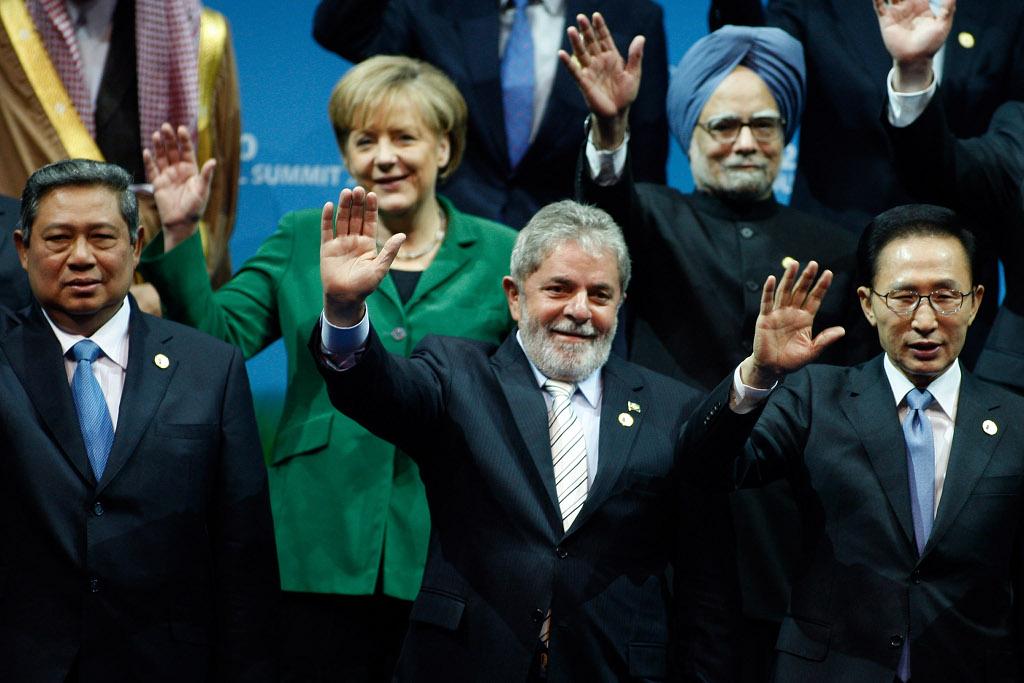Seoul soaks up the spotlight during G20
L-R: Indonesia’s President Susilo Bambang Yudhoyono, Germany’s Chancellor Angela Merkel, Brazil’s President Luiz Inacio Lula da Silva, India’s Prime Minister Manmohan Singh, South Korea’s President Lee Myung-bak wave during a family photo at the G20 Summit in Seoul on November 12, 2010.
Top News: Seoul was the proud host of leaders from the world’s top economic powers this month for the G20 summit. The two-day meetings resulted in little concrete progress in settling contentious issues around currency rates or trade imbalances, but South Korea President Lee Myung Bak declared the forum a great success in putting the small Asian country with the 13th largest economy on the global stage.
Seoul donned its Sunday best for its biggest international audience since the 1988 Olympics. Welcome billboards and banners adorned government buildings and markets, fesh flowers decorated median strips, and 27,000 colorful lanterns illuminated the Cheonggye stream that leads to City Hall.
To limit gridlock-as-usual, people were asked to leave their cars at home for the summit on Nov. 11 and 12, and a food waste processing facility was shut down for three days, so the scent of sour food would not waft past the visiting VIPs.
Nearly 6,000 volunteers were on hand to translate or give directions on the subway, and 4,000 journalists were expected to cover the event. Officials braced for protesters from 200 registered organizations, with 60,000 security personnel, including military riot troops. They also erected a seven-foot-tall neon green fence around the conference venue.
But no violent protests grabbed headlines, nor did any stunts from nearby North Korea, as some had feared.
An exchange of gunfire between soldiers on either side of the border in the mountains northeast of Seoul on Oct. 29 had worried leaders in anticipation of the high-profile event. No one was hurt, but it was the first such clash on land in more than two years.
The exchange cast a shadow over a much-anticipated reunion held the next day, the first meeting in a year of families divided by the border. The past few weeks also saw a multi-million dollar shipment of rice and other staples from the south to its food insecure neighbor in the north.
Economic suffering, caused by corruption, floods and a botched currency reform last year, has inspired a surge of North Korean defections to the south in recent years. More than 10,000 people sought refuge in South Korea in the past three years, officials said, roughly the same number as during the half century before.
A North Korean spy allegedly posing as a defector was arrested by South Korean police officers in October for attempting to carry out a mission to kill the highest profile North Korean ever to defect.
Announcement of the arrest was made shortly after Hwang Jang Yop, the former North Korean senior official whose 1997 defection deeply embarrassed party leaders, was found dead in his bathtub. South Korean officials have said the 87-year-old died of natural causes and that the arrest was unrelated to his actual death.
Money: A key disappointment preceded the G20 talks when negotiators for the United States and Korea failed to settle the terms of a free-trade agreement. Despite a concerted push on both sides, the three-year stalemate continued, with talks breaking down over U.S. calls for fewer restriction on cars and beef imports. The original agreement was signed in 2007 but has not yet been ratified by legislatures in either country.
Korea did come away from the summit with a freshly inked free trade agreement with Peru, the second South American country after Chile to negotiate a deal there. The agreement, to be implemented in 2011, will eventually eliminate import tariffs on Korean cars and televisions, and help secure Korean access to Peru’s natural resources. Earlier this fall, Korea also signed a deal with the European Union.
The economic summit offered a chance for politicians to discuss growing economic inequalities in the world and in Korea. The portion of South Koreans living in poverty made up 13 percent of the total population of 49 million in 2009, compared with 7.5 percent in 1990, according to government figures published his week.
At the same time the economy continues its unprecedented expansion, with South Korea’s Samsung Electronics Co. and Hyundai Motor Co. posting record earnings.
Elsewhere: The Korean Post Office is rolling out a new address system to be based on street names and numbers, rather than the land-lot numbers that are now used. The new system, popular in many developed countries, is intended to help foreigners, taxi drivers and emergency personnel find their way around without getting lost.
Japan has agreed to return more than 1,000 books taken during its colonial rule of Korea during the first part of the 20th century. The books, which have descriptions and illustrations of Josean Dynasty-era customs, represent only a small portion of the cultural treasures that were taken during the occupation.
A multi-year study of some dinosaur bones found near Korea’s southeastern coast has resulted in a model of the prehistoric creature. The herbivorous creature, which lived as many as 100 million years ago, was 3 feet tall, 10 feet long and weighed about 220 pounds. It’s the only dinosaur thought to have lived exclusively on the Korean peninsula. It will be called Koreanosaurus Boseongensis.
